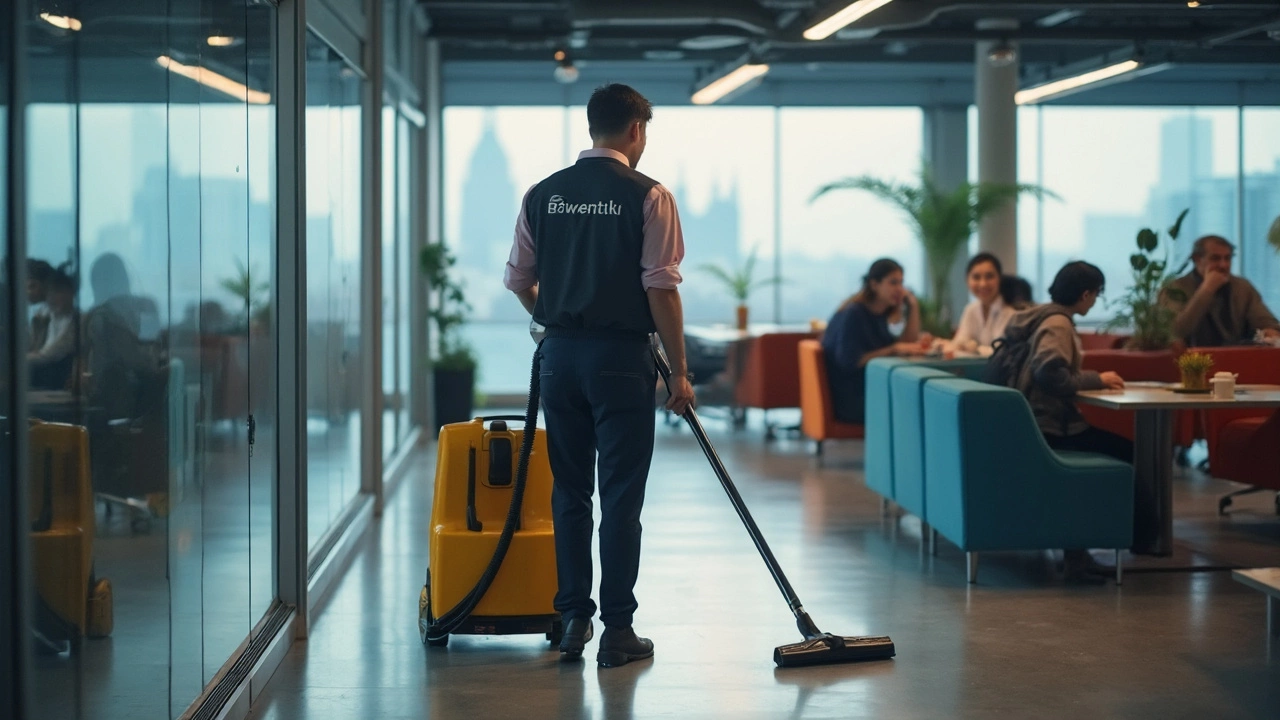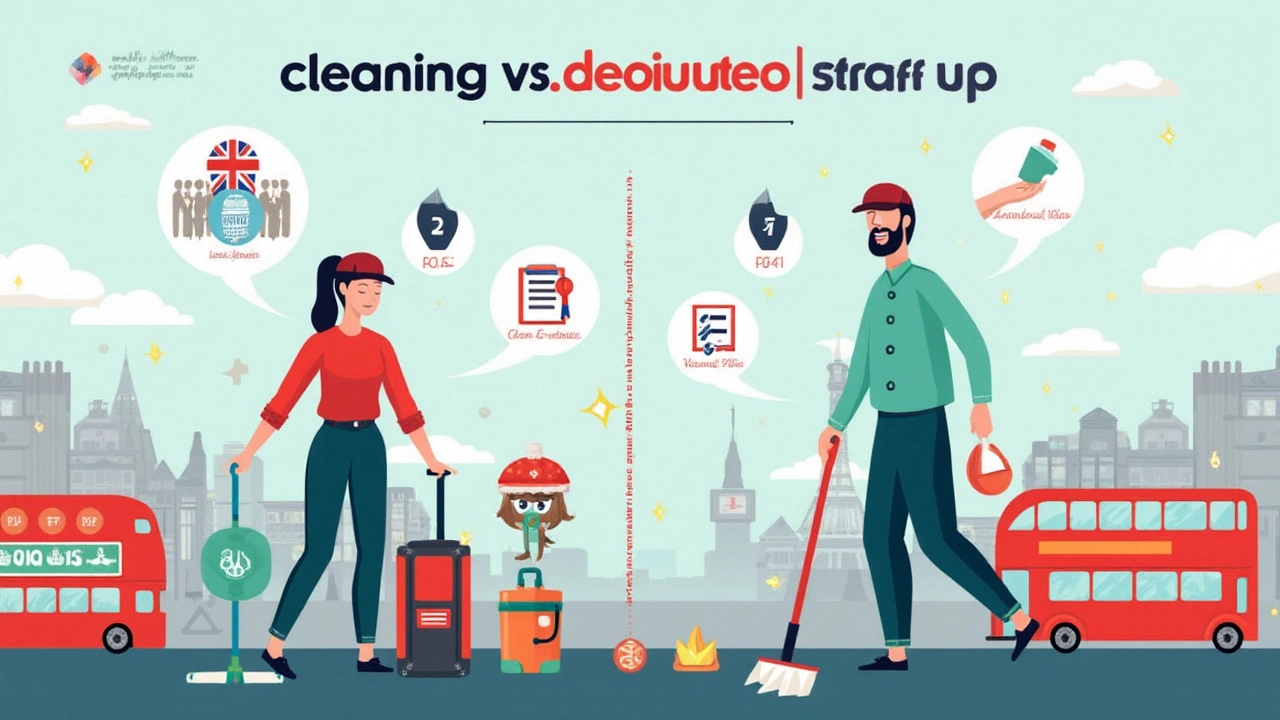You can have the fastest Wi-Fi, killer coffee, and a ping pong table that gets more action than your inbox, but none of it makes up for an office that smells like last week's microwave accident. Let’s face it—nobody raves about cleaning. Yet spotless keyboards and crumb-free conference rooms play a bigger role in your day than you might realize. Dirt in the workplace isn’t just a minor annoyance. According to the ISSA, the worldwide cleaning industry association, a clean office can reduce absenteeism by 46%. That’s nearly half the sick days gone—just from fewer germs hanging around.
The Usual Suspects: Who’s Tasked with Cleaning the Office?
The short answer depends on your company size and budget. In some start-ups or small companies, cleaning duties land on whoever draws the short straw—usually employees taking turns washing mugs and emptying bins. I’ve had jobs where our office manager signed her emails “Queen of Lysol.” In bigger offices, you’ll see professional cleaners in the early mornings or late nights, quietly making mouse pads less sticky and banishing unspeakable fridge smells.
Companies sometimes get creative. There's the cleaning roster—the 'everyone chips in' approach: a schedule sits on the kitchen wall, names and dates in bold. Sometimes, businesses hire in-house janitorial staff, especially when the building is large or has heavy foot traffic, like law firms or creative agencies. Larger corporations and co-working spaces usually outsource the whole deal to commercial cleaning companies. These cleaning crews are the pros: they know what to do with a broken coffee machine full of milk gone rogue (and they don’t quit halfway through).
Why does this matter? If you leave it up to employees, things get inconsistent. Someone forgets it’s their turn, and suddenly there are mystery stains older than your dog, Charlie. Outsourcing gets you predictable quality and fewer awkward glances at the overflowing trash next to the client meeting room. The flip side—professional cleaning might mean things get tidied up only outside work hours, and if a sudden mess happens mid-day, you’re back to paper towels and teamwork.
The Real Impact of a Clean Office on Health and Productivity
Science backs up the clean freaks: dusty desks harbor germs, mold, and enough allergens to make allergy sufferers contemplate remote work forever. The CDC has warned that shared work surfaces can host flu viruses for up to 24 hours. That means one sneezy meeting can turn into an office-wide bug if nobody is wiping surfaces down.
But grime isn’t just gross. It drags down productivity, too. According to a study published in the Harvard Business Review, clutter and dirt slow cognitive function and stress out workers. When your mind's juggling both deadlines and the scent of abandoned tuna sandwiches, good luck concentrating on much else.
Employees care. In a 2023 survey by the British Institute of Cleaning Science, over 88% of respondents said cleanliness affected their view of their workplace. A sparkly office says, "We respect you." A trash pile whispers, "You’re on your own." Bosses shouldn't take this lightly—happy workers stick around longer and call out sick less.
| Cleaning Frequency | Who Cleans | Office Size (Avg Desk Count) | Reported Sick Days Reduced (%) |
|---|---|---|---|
| Daily | Professional Cleaners | 100+ | 46% |
| Weekly | Employees | 1-20 | 19% |
| As Needed | Manager/Volunteer | 1-10 | N/A |

Employee Cleaning Duties: Pros, Cons, and Common Gripes
Some see employee cleaning as a way to build camaraderie. There’s a sense of “we’re all in this together”—up to a point. At that point, someone’s forgotten the fridge for three weeks, and now nobody will touch it. Real talk: it can go downhill fast. Arguments break out about who’s done more, who makes the most mess, or whose half-empty yogurt container is evolving into something alive.
But there are upsides. Employees who clean their own stuff tend to treat communal spaces with more respect. Teams build habits—rinsing out mugs, emptying bins, wiping desks. But expecting everyone to clean all the time is like expecting everyone to love Mondays, and we know how that usually ends.
You might find employees spending work hours wiping windows or tackling bathroom messes. That doesn’t just sap morale—it eats into productivity. Then there’s the hygiene question. If nobody’s trained to sanitize properly, are you really getting rid of germs, or just moving them around with the same sponge?
- Set clear ground rules: spell out expectations and make hygiene part of the work contract.
- Rotate less pleasant tasks to spread the pain out.
- Keep proper supplies always handy—no point in assigning fridge duty if there’s no disinfectant around.
- Don't let anyone hoard the good mugs—set a timer for periodic communal cleanouts.
The Case for Professional Cleaners: Worth the Investment?
Professional cleaners know their stuff. Licensed cleaning companies follow strict protocols, use the right chemicals, and cover all those hard-to-reach spots nobody has time for. They’re also insured, just in case something breaks. Did you ever think about what happens if someone gets injured lifting office equipment or using cleaning chemicals? Most employees aren’t trained, which could spell trouble.
The British Cleaning Council reports that businesses investing in regular professional cleaning see consistent improvement in both employee wellbeing and client perceptions. Cleaners are also discreet—they come in after hours, do their magic, and don’t interrupt your workflow. And because they’ve seen everything, nothing fazes them. (If you’ve ever found what’s behind the office couch, you know that’s a skill.)
Let’s talk cost. Professional cleaning isn’t free, but when you compare the expense to the cost of employee sick days or low morale, the numbers make sense. On average, UK businesses lose £77 billion a year to absenteeism, according to a 2024 Statista survey. Skimping on cleaning can turn those stats against you.
"A clean office isn't a luxury—it's a business essential that pays back in loyalty, productivity, and reputation." — Facilities Management Journal

Tips to Keep Your Office Clean: Practical Steps for Every Workplace
Want a cleaner workspace, minus the drama? Here are some pro tips I’ve picked up (even though my dog Charlie is still trying to figure out the vacuum):
- Set up cleaning zones: Assign small areas to individuals or teams (think kitchen, printer station, conference room). Smaller duties feel less overwhelming.
- Use signs and reminders: Gentle nudges work. Stickers over the sink or friendly reminders above the bin make a difference.
- Stock up on supplies: Make disinfectant wipes, sprays, and microfiber cloths visible and easy to grab. Hiding them in a locked cupboard won’t help anyone.
- Clear-as-you-go policy: Encourage staff to tidy up immediately after eating or meetings. Leftovers breed resentment faster than mold.
- Host regular clean-outs: Pick a day every quarter for an all-hands cleaning blitz. It’s a reset button for the workspace.
- Reward cleanliness: Recognize efforts, even with something as small as a shoutout in a team meeting or a free coffee for the tidiest desk.
- Don’t forget the forgotten spots: Light switches, door handles, keyboards, and phones all collect germs quietly. Wipe them down regularly.
- Get feedback: Ask what works, what doesn’t, and course-correct if your system is more hassle than help.
At the end of the day, office cleaning responsibility is about respect—for yourself, for your coworkers, and for any unlucky clients who show up with sharp noses. Whether you’re team professional or team DIY, don’t ignore what’s right under your own nose. Sometimes, the simplest act—like wiping down a countertop—can make the biggest difference in how everyone feels at work.
